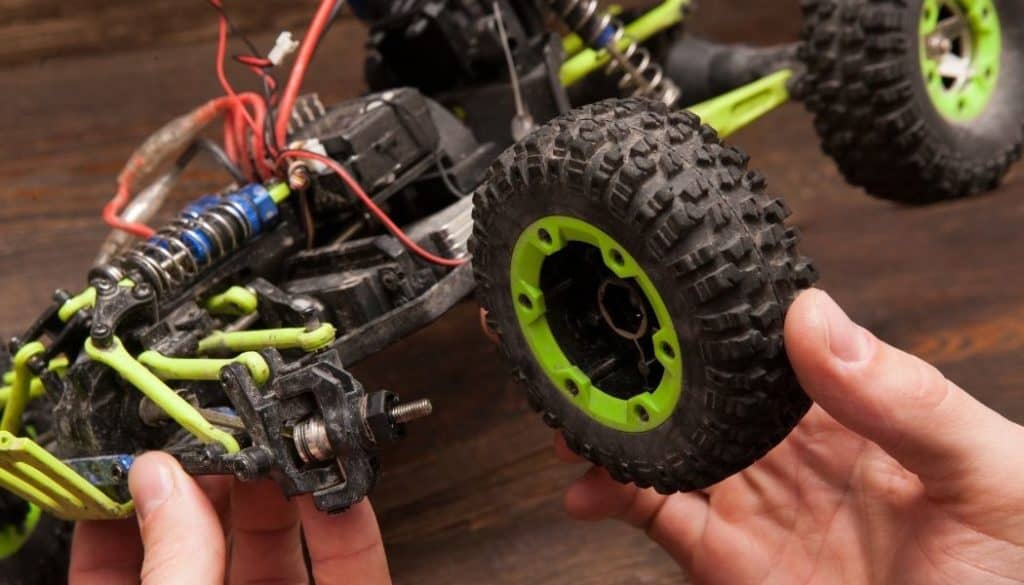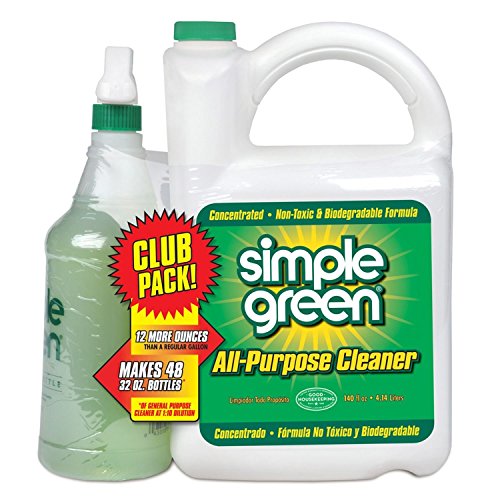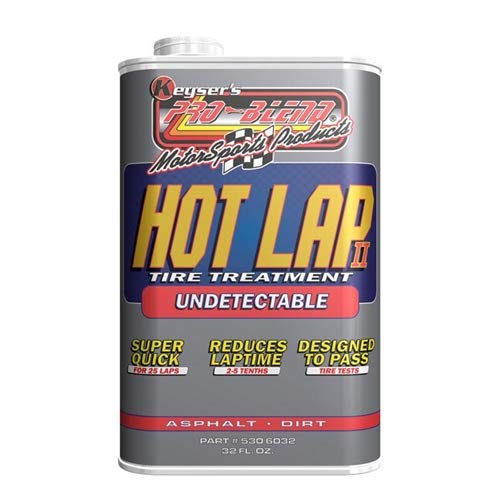RC car racing relies heavily on a driver’s skill. But without soft tires, even the most experienced hobbyists or professionals will struggle to cross the finish line. So how can you make your RC tires softer?

Here’s how you can make your RC tires softer:
- Spray tires with WD-40.
- Use penetrating oil on your tires before a race.
- Clean tires’ rubber surface with a cleaning solution.
- Lubricate tires with PB B’laster.
- Hand massage your tires.
- Use tire treatment products.
Do you want to improve your control when racing on different terrains? Or are you in search of ways to enhance your RC car’s output? Read on to learn more about the dos and don’ts of softening RC tires.
Why Should You Soften RC Car Tires?
The real fun in owning an RC car comes when you can drive and control the car with relative ease across various surfaces. However, most RC cars often come with hard tires when new, which can make navigation harder.
Below are some of the reasons why you should soften your RC car tires.
Softening RC Car Tires Improves Traction
Naturally, hard rubber tires usually have reduced traction, meaning they won’t have good enough grip, especially when driven on potentially slippery surfaces. But by softening the tires, you’ll significantly increase traction, thus improving your overall performance when racing on different types of tracks.
Softening RC Car Tires Improves Control
Softening car tires will also improve your overall control when driving the car. This means you’ll have better chances of navigating tricky corners without having to slow down. Moreover, improved control will allow you to accelerate or slow down easily when racing.
Softening RC Car Tires Improves Your Car’s Output
When driving an RC car with hard tires, you’ll find it difficult to accelerate or come to immediate halts as you navigate past sharp corners. However, after softening, you’ll be able to get more out of your car’s motors and batteries, which helps give you an edge during races.
Ways To Make RC Tires Softer
As I previously mentioned, softening RC tires comes with a lot of benefits, from increased traction to improved overall control. So, if you want to get the most out of your car, below are some of the proven ways to make RC tires softer.
1. Spray Tires With WD-40
As the name suggests, WD-40 (available on Amazon.com) is a water-displacing spray used for several functions, including lubrication, moisture displacement, and surface softening. Most RC car hobbyists highly prefer WD-40 not only due to its ease of availability and performance but also because it is non-reactive on surfaces.
With WD-40, you won’t need to worry about deforming, damaging, or wearing out your tire, as all the product does is soften the rubber and make it tackier for improved performance.
PRO TIP: It's best to avoid leaving tires in WD-40 for more than two days because they might end up swelling.
2. Use Penetrating Oil on Your Tires Before a Race
Available on Amazon.com, Liquid Wrench Penetrating Oil (LW) is a penetrating oil known to seep into the smallest openings and fissures, helping to loosen surfaces. If you’re looking to soften your RC tires just before a race, then it’s best to use a liquid wrench as it tends to dry up within 30 minutes.
PRO TIP: Compared to WD-40, Liquid Wrench works a lot faster. But it's also a lot stronger on rubber, meaning you shouldn't let your RC tires soak in LW for long. You can also mix LW in equal parts with a non-chlorine brake cleaner if you want your tires to dry extra fast.
3. Clean Tires’ Rubber Surface With a Cleaning Solution
Simple Green All-Purpose Cleaner (available on Amazon.com) is a commonly used tire conditioner that can also work wonders when used on RC tires. As a well-known cleaner and degreaser, it’s commonly used to clean different types of surfaces from fabric to carpets, rubber, and even flooring.
And although Simple Green won’t be as effective as WD-40 and LW in softening your RC tires, it does a great job in cleaning the rubber surface, making the tires stickier in the process.
There are different ways to apply this product to your tires. You can spray and soak your tires in a 50:50 Simple Green and water solution. Alternatively, you can use a toothbrush to rub in the all-purpose cleaner and ensure it gets deep into the pores of your RC car tires.
NOTE: Allow Simple Green a couple of hours to a day or two to dry before reinstalling them to your RC car.
4. Lubricate Tires With PB B’laster
Although commonly used to loosen bolts and rusted parts, PB B’laster (available on Amazon.com) can also help to soften your RC car tires. PB Blaster contains a strong, non-evaporating lubricant that penetrates the pores of rubber surfaces, causing a reaction that leaves the tire surface softer than before.
NOTE: PB Blaster contains a high-performance formula that can end up damaging RC tires if soaked for long. Therefore, if you must soak your tires in a water-PB Blaster solution, then it's best to time the process and monitors the tires regularly.
5. Hand Massage Your Tires
If you don’t fancy using chemical-laden products to soften your RC car tires, then you might want to try hand massaging your tires. Granted, this method isn’t the most effective and will probably require additional effort and time to soften the tires to the desired level.
Some tires tend to respond well to hand massage better than others. Either way, you’ll need to squeeze the tire(s) vigorously until they loosen up and become softer. The harder and more consistently your hands massage the tires, the faster they’ll soften up.
PRO TIP: People prefer using this method as a way to further soften the tires after spraying them with the likes of WD-40 and Liquid Wrench.
6. Use Tire Treatment Products
Hot Lap Tire Treatment needs no introduction when it comes to quality tire treatment products. And although it’s designed for professional race cars and tires, you can still use the treatment to soften up your stock tires.
PRO TIP: When using Hot Lap to treat your tires, use a toothbrush to ensure you apply the treatment to all the parts. Target both the interior and exterior of your tires to achieve desired outcomes.
What Not To Use To Soften Tires
Unfortunately, not all methods are ideal for softening RC tires. While some methods might work for a while, they might end up doing more harm than good, forcing you to purchase new tires.
Below are methods and products you should avoid when looking to soften RC car tires.
1. Boiling Your New Tires
It might be tempting to boil your new tires since, after all, boiling tends to soften things up, right? However, while boiling might sound harmless at first, it can end up damaging your tire, and you don’t want that!
Almost everyone who has attempted to boil RC car tires ends up complaining that nothing changes in terms of softness. The only difference is the tire will probably get damaged from the rims to the foam inserts and even the finishing.
2. Applying Kerosene
Some RC car hobbyists use kerosene to soften their tires. And although it’s a great way to soften rubber, it usually ends up damaging the tires because kerosene gradually eats rubber, meaning your tires might start to swell and inevitably lose their elasticity.
When used as a rubber tire softener, kerosene usually works best if frequently used. This means you’ll need to soak your tires in it regularly if you want them to retain their softness. However, be warned that your tires will wear out at a faster rate when exposed to kerosene on numerous occasions.
3. Using Diesel
Some RC racers still prefer using diesel as a rubber softener despite its ability to corrode rubber. All factors considered, you should avoid using diesel minutes before a race as it can easily contaminate the dirt and soil, making the track slippier and stickier.
Diesel isn’t a recommended softener due to its corrosive potential, as it can easily eat your rubber tires away when soaked for several hours. So, if you must soak your RC tires in diesel, it’s best to apply it using a toothbrush and allow it to soak for around an hour.
NOTE: After applying diesel on RC tires, I recommend you clean the tires with Simple Green, or any degreasing and cleaning solution and remove traces of diesel. This will reduce the chances of damage.
4. Turpentine
Turpentine is a highly effective solvent that can also function as a tire softener. When using turpentine, however, it’s highly advisable to monitor the progress of your RC car tires. This is because turpentine usually makes tires bigger, which can greatly affect your performance when driving on tricky terrain.
PRO TIP: If you must use turpentine, try soaking it for no more than half an hour, lest you end up with oversized tires that can’t be used. Some RC car hobbyists advise against soaking tires directly in turpentine, instead urging drivers to mix the solvent in water before applying it to the tires.
5. Acetone
Acetone is a great organic solvent known to dissolve various types of organic materials. When applied on rubber surfaces, it can smoothen the surface significantly, improving grip and overall control in the process.
However, despite the chemical’s brilliant solvent properties, using it frequently on RC tires will almost certainly lead to degradation and increased wear and tear.
And since you’ll need to apply acetone regularly (and generously) to achieve the desired level of softness on your tires, chances are you’ll end up shortening your tire’s useful life.
Tips To Observe When Softening RC Tires
When softening RC tires, you can either do a great job and increase overall traction or make the tires excessively soft and sticky. The following tips should come in handy as you prepare to make RC tires softer.
1. Check on Application
When applying a softener, it’s crucial to spread it across the entire surface of a tire to achieve uniform softness. So be extra careful when spraying a softener as you’ll need to target all the surfaces.
Similarly, you’ll also need to practice caution if you opt to soak your tires in softening solutions like WD-40 and LR. Remember, oversoaking tires increases the chances of damage, especially when using potentially corrosive softeners.
2. Try Out Different Methods
There’s no perfect tire softening technique. What might work for a particular brand of tires might fail when used on others. The trick is usually to try out different methods until you find one that softens your tires without speeding up the rate of wear and tear.
You can even combine two methods. For instance, after soaking tires in WD-40, some racers prefer hand massaging the tires a couple of hours before a race to ensure they’re extra soft. Whichever method you opt for, it’s important to note that tires will respond differently to various chemicals. As a result, it’s good to keep an open mind and try out different methods.
3. Remember To Rinse Your Tires
After you’re content with the degree of softening, it’s important to rinse your tires to eliminate all traces of the softening chemical, especially when using strong products. This is because strong chemicals like Liquid Wrench can end up severely eating your rubber tires if not removed properly.
Consider using products like Simple Green to remove some potentially aggressive softeners like LW and even WD-40.
4. Prioritize Safety
If you choose to soften using one (or some) of the chemicals discussed in this article, then you’ll need to observe safety guidelines to the latter. Avoid handling the chemicals with free hands as some chemicals can cause severe injury if they come in contact with your skin.
Most softeners produce potentially toxic fumes, hence the need to work in well-ventilated areas. Therefore, if your garage isn’t well-ventilated, then it’s best to apply the softeners outside, at least until they dry completely.
5. Monitor the Process
The RC car tire softening process is dependent on several factors, top of the list being the type of softeners used and the brand of tires. Due to this, it’s crucial to keep a keen eye on your tires and test for softness every now and then to determine if the process is complete.
Allowing RC tires to soak in softening solutions long after they’ve softened appropriately can lead to irreversible damage. Therefore, don’t hesitate to check on your tires, especially when using strong softeners.




